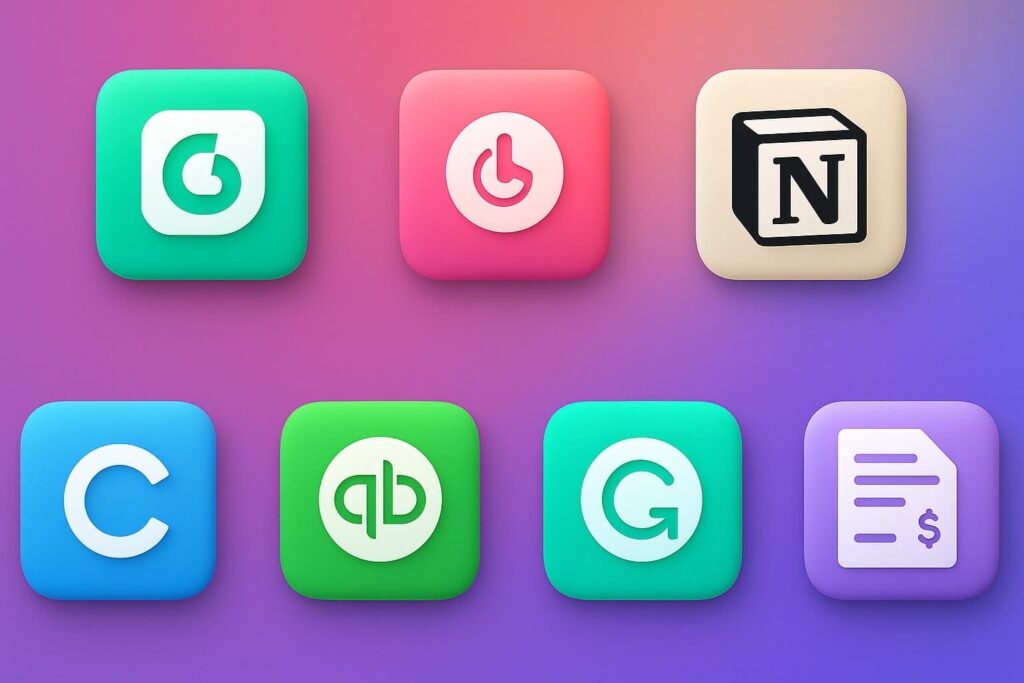
The freelance economy has been booming since 2020 and more so in 2025, as more professionals choose the freedom and flexibility of working for themselves. But that freedom comes with responsibility—freelancers handle everything on their own, from scheduling meetings to filing taxes.
The good news? The right tools help you stay organized, get paid faster, and grow your brand with less stress.
Whether you’re just getting started or ready to take your business to the next level, these seven tools can make a real difference.
1. Bonsai
Bonsai is a favorite among freelancers for a reason. It offers a complete suite of tools for managing proposals, contracts, time tracking, invoicing, and even taxes. Its simple interface and automation features help you save time and look professional when dealing with clients. You can track billable hours, auto-generate invoices using a professional invoice template, and set up reminders so nothing slips through the cracks.
Why it’s essential: Streamlines your entire workflow from pitch to payment.
2. Toggl Track
Most freelancers don’t realize just how much time they spend on certain tasks until it’s too late—they either burn out or miss out on income. Toggl Track makes it easy to keep tabs on your time across different projects and clients. You just hit start, get to work, and stop the timer when you’re done. You can tag each entry, review your hours, and spot where your time is going each week.
Why it’s essential: You stay in control of your time and make sure you’re getting paid for all of it.
3. Notion
Freelancers love Notion because it adapts to just about anything. You can use it to plan projects, write drafts, save client notes, build databases, and track personal or business goals—all in one place. Want a content calendar? A task list? A space to onboard new clients? You can build all of that with a few clicks.
Why it’s essential: It keeps everything—from your notes to your goals—organized in one spot, so nothing gets lost in the shuffle.
4. Calendly
Coordinating meetings with clients across time zones can get messy. Calendly makes it seamless by letting clients book appointments based on your real-time availability. You can integrate it with Zoom, Google Meet, and your calendar so everything stays in sync.
Why it’s essential: Saves hours of back-and-forth and prevents scheduling conflicts.
5. QuickBooks Self-Employed
Handling finances is often the least favorite part of freelancing. QuickBooks Self-Employed simplifies it by tracking income, expenses, mileage, and tax deductions. Whether you’re managing a creative business or doing WordPress freelancing, it’s beneficial at tax time, offering estimates and helping you prepare for quarterly payments.
Why it’s essential: Makes financial compliance and planning manageable, even if you hate math.
6. Grammarly
Whether you’re writing proposals, reports, or marketing content, your writing reflects your brand. Grammarly catches grammar mistakes, suggests better phrasing, and helps maintain a professional tone. The premium version even checks for clarity, consistency, and engagement—perfect for client communications.
Why it’s essential: Helps you sound polished and credible, no matter your industry.
7. Invoice Generator (Any)
Getting paid on time starts with sending invoices that are simple, professional, and reflect your brand. A good invoice generator with customizable templates makes it easy to create clean, polished invoices in just a few minutes. Look for features like automatic tax calculations, due date reminders, and the option to save client info for recurring billing.
Any invoice generator out there can offer free invoice templates made for freelancers. They’re easy to personalize, work with common file types like PDF and Excel, and are designed for all sorts of industries—from design and writing to consulting and web development.
Why it’s essential: It keeps you on top of payments with minimal effort and no stress.
| Tool | What It Does | Why It’s Essential | Ideal For |
|---|---|---|---|
| Bonsai | All-in-one platform for proposals, contracts, time tracking, invoicing, and taxes | Streamlines the entire workflow from pitching to getting paid | Full-time freelancers & consultants |
| Toggl Track | Simple, powerful time tracking across projects | Ensures you bill accurately and avoid time-wasting tasks | Freelancers juggling multiple clients |
| Notion | All-in-one workspace for notes, databases, planning | Keeps everything organized and accessible in one place | Freelancers managing complex tasks |
| Calendly | Smart meeting scheduler with calendar integration | Eliminates email back-and-forth and prevents double-booking | Client-based freelancers & coaches |
| QuickBooks Self-Employed | Bookkeeping, tax tracking, and mileage logging | Makes tax season painless and keeps your finances in check | Solopreneurs & side hustlers |
| Grammarly | AI-powered writing assistant | Helps you sound polished, professional, and clear in every client interaction | Writers, marketers, consultants |
| Invoice Generator + Templates | Customizable invoice creation tool | Sends branded, professional invoices in minutes—no design skills required | All freelancers needing fast payment |
Freelancing gives you the freedom to work on your own terms, but it also comes with its challenges. The good news is, you don’t have to handle everything alone. With the right tools, you can free up time, stay organized, and present yourself as the professional you are. These tools help with everything from tracking projects to handling invoices and taxes.
Whether you’re looking to grow your business or just need a better work-life balance, investing in systems that work for you lets you focus on what you do best—your craft. And for invoicing? Start with templates that do the heavy lifting for you. Your future self—and your finances—will thank you.
Source:https://gauravtiwari.org/must-have-tools-for-freelancers/

